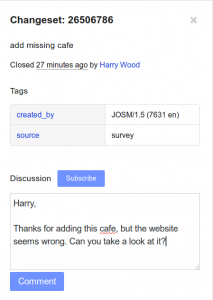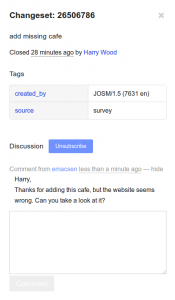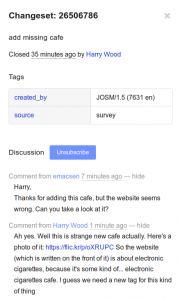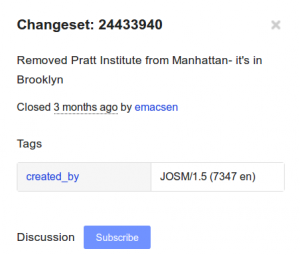Community and communication are key to the success of OpenStreetMap project, yet discussions about individual edits have always been clumsy and awkward. In this post, I’ll describe Changeset Discussions, a new feature of the OSM website which allows people to have public discussions around changesets.
Before Changeset Discussions
Before the introduction of Changeset Discussions, the only way to communicate about a changeset was either to use an out-of-band communication medium, such as mailing lists or forums, or to communicate directly with the author of the changeset by OSM message. Both of these methods are clumsy.
The result is that it was often difficult to discuss changesets. New users rarely received any positive feedback or helpful instructions, and controversial edits were often handed off to the DWG instead of being able to have an public discussion about them.
Introducing Changeset Discussions
Changeset Discussions address this problem by letting users have a discussion about a changeset directly on osm associated with that changeset. This discussion is public, which allows for contributor collaboration.
This feature works similarly to the comments placed on an OSM Note, where users may discuss a note publicly, for example to ask for more information from the note submitter.
Leaving a Comment on a Changetset
Changeset discussions now part of the OSM website. To use them, on the changeset page, on the left hand side, you can enter a comment:
Then click submit, and the comment appears:
Once Harry replies, as he’s done here:
…I receive an email notification.
Subscribing/Unsubscribing from a discussion
Once you have made a comment to a changeset, you will receive notifcations about new comments placed on the changeset, keeping you in the loop and part of the discussion. You may also choose to watch a changeset discussion without participating in it, by using the
Subscribe button.
If you don’t want to continue to watch the changeset, just press the Unsubscribe and you will no longer receive alerts of new comments.
Use Cases for Changeset Discussions
- Welcoming New Users
It’s been pointed out before that OSM has a problem in communicating with our new users. Changeset discussions can be a perfect place to congratulate on their first edit.It can also be an opportunity to help new users by giving them specific feedback where they might not have been as strong, giving them specific feedback on tagging, for example.
- Leaving Positive Feedback
As a community, we don’t reciveve much positive feedback on our edits. With changeset discussions, you can leave a positive comment on a changeset expressing your thanks.
- Asking Questions About Controversial Edits
If you have a question about an edit, such as why a name was changed, or a road was reclassified, you might want to ask the user why they made the change. Putting that question directly on the changeset gives the original author to receive feeback from you, but to respond to that feedback in a public forum. This should result in more open, public discussions and hopefully fewer conflicts.
There’s an API
Changeset Discussions also have an API component, which will be documented on the wiki, which will allow this feature to be integrated into OSM editing software directly, further connecting the editing process with the communication/community process.
Special Thanks
Changeset Discussions came into OSM by way of Google Summer of Code, specifically by our student Lukasz Gurdek, who I had the pleasure of mentoring. His work was of absolutely Grade A calibre and it was a pleasure working with him.
Also, a huge debt of gratitude to Tom Hughes, who worked with myself and Luksaz to get this code merged into the OSM.org codebase. Without his hard work, this feature branch might have never made it into the website.
And of course I want to thank Google for their Google Summer of Code project, which made this possible
This post is also available in: Japanese





This is really great! I remember asking for this kind of feature not that very long ago 🙂
Next great thing would be object watchlist, where I’d get an e-mail everytime someone touched an object on my watchlist.
Guttorm, nice work in the Vestfirðir!
About the object watchlist we have been thinking of creating it for the Iceland data to begin with. Even some sort of sending once a year an update to those e-mails in the database to notify them of their current listing and suggestions about how to add more or fix wrong.
This is a great feature! I can see manu potential use cases.
One problem that I forsee is when some iD editors make dozens of minor changesets with no comments. It’s not entirely their fault, but the software could be designed to discourage that kind of behaviour.
There is an issue about that: https://github.com/openstreetmap/iD/issues/2251
Excellent! I reckon a decent, actually maintained diff tool on OSM.org would also go a long way towards this goal of further participation. At least this solves one big problem — editor turf wars (hopefully the discussions won’t get too heated :)).
Thank you Lukasz, Tom, Harry and everyone else involved. This is a very useful addition.
May I ask one question for the benefit of new or potential contributors? What, in overview terms, is a “changeset” ?
Hi Michael,
changesets are nicely described in the .
I meant to link to this article http://wiki.openstreetmap.org/wiki/Changeset
I would love to see the discussion box below the objects list – at least if there is no discussion yet. That just occupies precious space and often causes the need to scroll (more) to see the changed objects. Also the text box does not need to be there (empty) while it is empty. No need to show nothing if showing nothing would also be possible with a short text “no discussion yet. [start one]”.
Some brainstorming: One thing I could imagine as a probably easy addon is to have some “checked by user foobar” flag or a separate discussion area without a notification of the editing user. Especially for newbie or suspicious edits (maybe due to many deletions) this has the potential to eliminate duplicate checks by others users. I would not like to send a spam-ish notification about a changeset discussion entry to the user in that case. Well, for newbie edits this could be merged with a “thanks, welcome” comment. Hmm, hmm, …
However, that seems to be a nice feature, thanks!
Pingback: weekly 224 – 28.10.–03.11.2014 | weekly – semanario – săptămânal – haftalık – 週刊
Regarding my “I would love to see the discussion box below the objects list”: I did it myself now: https://wiki.openstreetmap.org/w/index.php?title=User:Aseerel4c26/osm.org_UI_fixes_by_JS&diff=1110052&oldid=1030727 This works as long as the sidebar is not loaded by JavaScript but fully from the server (a full new page load).
Thanks for this great feature! I can see many usages, especially I can see the possibility of welcoming and guiding newcomers, who can be doing mistakes in the beginning without beeing aware of them.
HOWEWER, I think this lacks one small but important piece. You can not tell easily, whether the changeset is from a novice (read first 50 edits), itermediate (up to say 300 edits) or advanced user. It is very different in the way you should approach the user.
I suggest: Please prefill the textt of the comment with gray text saying something like (in case of novices) “This is one of the first edits of this novice user, please be welcoming to him” …. you get the picture. The text would disappear once you click in the window.
What do you think?
Nice feature. Is there a feed for all new discussions? I mean a place where I can learn what changesets are being discussed?